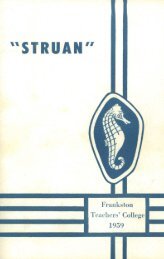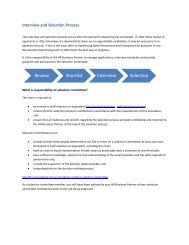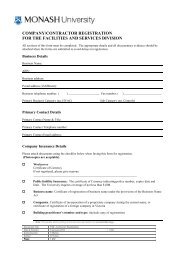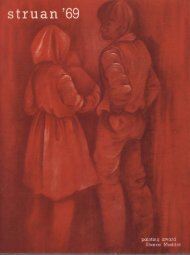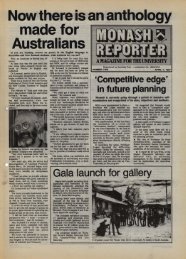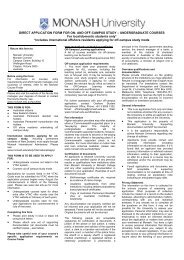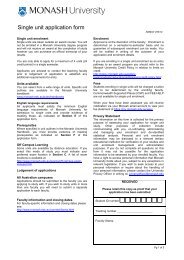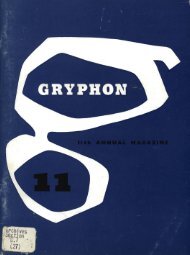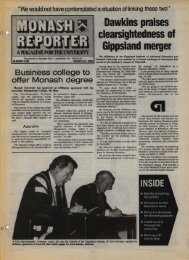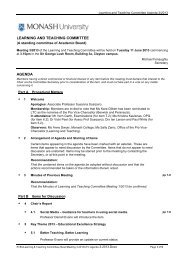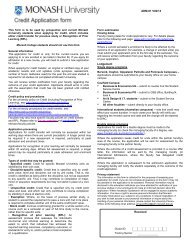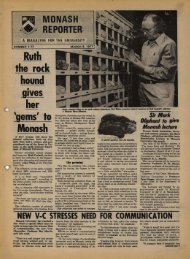Struan 1961 - Adm.monash.edu
Struan 1961 - Adm.monash.edu
Struan 1961 - Adm.monash.edu
You also want an ePaper? Increase the reach of your titles
YUMPU automatically turns print PDFs into web optimized ePapers that Google loves.
This self is fragile, isolated and oppressed, keptalive only by our clutching at dead straws."No comfort could we claim except from thatone wavering inward flame ."But even this flame is stifled:"Stretched fingers freeze, which were but chilledbefore."Memory beats our lives to a pattern, and althoughwe believe that we are our own masters, we arebattered by memory.Memories of the so-called "still living dead" areabout us on all sides. All features of our environmentbreathe memory. Man is bound by, andhis actions limited by the past and heredity."They are about us on all sides: the dust isrestless ... "Man and things pass, but memory remains.Though man may shelter himself from memory,memory lives - memory is the ultimate reality."And we ourselves are memory, and retain,So much of those gone . . ."Man has lost simplicity, and consequently objectivity. It is better to reckon with memory and soobserve what truth there is, than to go on strugglingin our complex society. The truth thatmemory reveals, is the unfolding truth, the life inmotion."Foresight is but a bargain that we make,Which, even should life keep it, death will break,"are the closing lines of the next section. These, Ibelieve, reiterate the theme, being that there is nopresent: it dies on the instant. Our decisions arenecessarily hurried and ineffectual.Blind faith is the best and only way to endurethe buffets of fate and circumstance, and the blameimputed of innocent actions.Fitzgerald then introduces the key thought - thatarise out of his concept of the meaning of Memory- to honour the dead and fulfil their splendidwork, we should not doubt or despair, but plungeinto gay, constructive living.We should strive and struggle upwards becauseeffort is good, and truth resides in battle andconquest."Wherefore all good is effort, and all truth encounteredand overcoming . . ."To preserve the integrity of our inner self, weshould build upward whatever the result, ordespite the lack of results."Whatever the task, it lies in front: we mustBUil~ uPw~,rd though we guess not to whatskies ...The concluding thought is that memory is theone constant: it is the only stable link between thepast and what is to come, and bold venture is theonly possible enterprise.Throughout "Essay on Memory," "rain" is arecurring symbol, and an element of unity."Rain," like "Memory," is inescapable - neithercan be prevented, and both can be unpleasant andunavoidable.The symbol is appropriate for revealing thenature and function of memory because it is omnipresent-inescapable,life bringing cyclis, and thetransforming element in nature; the indispensablecondition of life .It is also one of the elemental primary agents,which affect man's primitive feelings.Fitzgerald builds up an accumulating, massive,overwhelming effect by his selection of words.For example, he wishes to depict memory ashaunting:Page Twenty-two"Impatiently, there raps at a sealed door thefury of chill drops."The imagery is continuous, developing, interrelatedand sustained:"Rain over the world,One handspan counts a million splashesHurled minute by tireless minute . . "In the thirteenth section of "Essay on Memory,"a glimmer of hope is introduced into the so-farrather depressing and haunting theme. Here Fitzgeraldchanges his symbol - it is the same symbol,but he has brought a change in it. The change isthat of rain which is welcome - rain, after a long,dry, dusty period. This is certainly an apt symbolfor the element of hope which he here introduces:"Rain in the clean sun falling-riches of rainWash out the dusty fear, the air's dull strain:Ay, Memory is a shower of gilded dartsWhich pin today's delight on our healedhearts ..."The rhythm of "Essay on Memory" has a movementof finality which suggests the inevitability offate and conveys a feeling that the last syllablehas been spoken or sounded.Most of the sentences are very long (perhaps toolong, straining the intellect too much, and impoverishingthe feeling), but probably the poet'sintention in this regard is to make the rhythmcomplementary to the thought suggesting the inexorablecontinuous flow of memory:" Well might our senses shudder when flesh hearsthe coming unseen, the spectre-march of years;for though a man face fortunes horror-haunted,gruesome with prophecies, and a grin undaunted,shall he bear blame from the accusing eyesof legions grey with agony? bear their criessinking in floods of fire he dreams not ofand has condemned them to in very love?"Fitzgerald has certainly written a fine poem; it isa very deep and complex piece of writing, inwhich he has tried to arouse the reader to manyfrightening and awakening truths about himself.WE WOULD CALL IT FUTUREI would be today and tomorrowDark hanging cloud:Spider webs taut with blind hopeFloat towards the darknessWould cling and clutchwhere nothing exists.We would call it future.The entanglement of threadsCan be only todayWhen they are not threadsBut four square solid beingsnow subtly intermingled in ecstasynow flat sharp clashes of colourSparkling in protest.Our hope too trails the skyEmerging from reality day by dayinto the vacuum.Spiralling clinging upwards into that blacknessAs we clin g in frightened hopeWith each embrace todayWe lose in reality,With solid casing our present solidifies around usAnd spiralling above our futures intermingle.STRUAN



